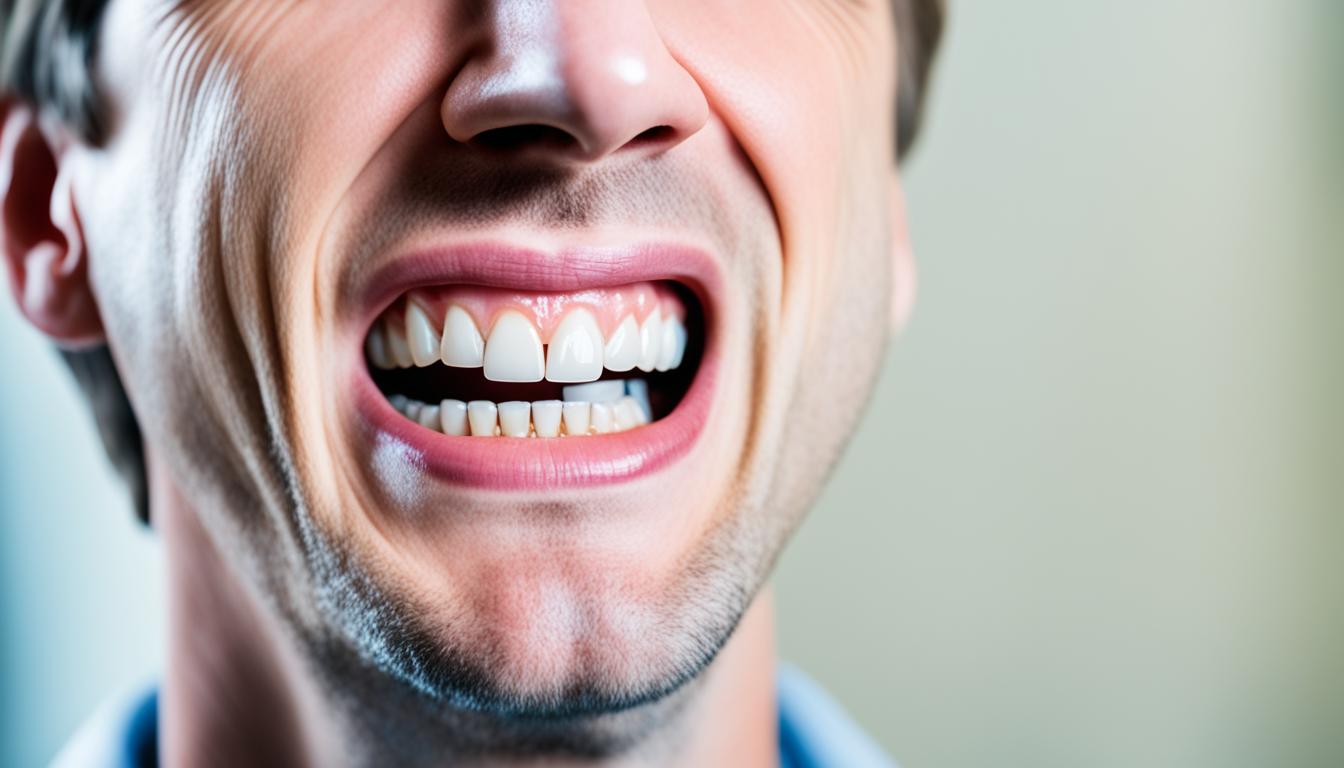Teeth grinding, or bruxism, is when a person involuntarily grinds, clenches, or gnashes their teeth. It can happen at night or during the day, affecting people of all ages. This condition can harm the teeth and general health.
Signs of teeth grinding include jaw pain, headaches, sensitive teeth, and teeth that look worn. These problems can lower someone’s quality of life by causing discomfort and limiting their daily routine.
Several things can lead a person to grind their teeth. Stress is a big one, as it can make muscles tight and cause the jaw to clench. Not having the teeth fit together well (malocclusion) is another possible reason. Some drugs and family history might also make someone more likely to grind their teeth.
It’s not always easy to tell if you grind your teeth. Many people don’t know they do, especially if it happens while they sleep. Figuring out if someone grinds their teeth might need a dentist or doctor to look into it. Sometimes, a test at a sleep center like polysomnography is necessary.
To help with teeth grinding, handling stress is a good start. Relaxation methods and meditation can lessen muscle strain and lower teeth grinding. Avoiding caffeine and alcohol could also be helpful. Using a mouthguard designed by a dentist can protect the teeth and jaw joint. For a few people, stem cell therapy is an option if other treatments don’t work.
Key Takeaways:
- Teeth grinding, or bruxism, is when a person involuntarily grinds, clenches, or gnashes their teeth.
- Common symptoms of teeth grinding include jaw pain, headaches, tooth sensitivity, and worn-down teeth.
- Stress, improper tooth alignment, medications, and genetic factors can contribute to the development of teeth grinding.
- Diagnosing teeth grinding may require a comprehensive evaluation by a dentist or doctor, and in some cases, an overnight sleep study.
- Treatment options for teeth grinding include stress management techniques, lifestyle changes, dental interventions, and the potential use of stem cell therapy for severe or treatment-resistant cases.
Symptoms and Consequences of Teeth Grinding
Teeth grinding, known as bruxism, has different symptoms and can lead to long-term issues. The main sign is the grinding of teeth, sometimes during sleep or while awake. This can cause several problems and discomfort. We’ll look at the signs and what teeth grinding can lead to.
Symptoms of Teeth Grinding
If you grind your teeth, you might show certain signs. These include:
- Jaw pain
- Headaches
- Tooth sensitivity
- Worn-down teeth
The intensity of these signs varies. Some might feel only a bit of discomfort. But others could face more serious issues.
Consequences of Teeth Grinding
Teeth grinding can seriously affect your oral health and life. Here are some possible outcomes:
- Tooth damage: Grinding and clenching can break or loosen teeth. This can weaken them and lead to tooth loss.
- Temporomandibular joint disorder (TMJ): The pressure can cause TMJ, leading to jaw pain and movement troubles.
- Bite problems: Grinding can also mess up your bite, causing pain and dental issues.
- Dental restorations: It might trouble dental work, causing it to break or need fixing.
It’s crucial to seek treatment for teeth grinding early. This can avoid more damage and relieve pain. Dentists have ways to help and treat you.
Finding the best treatment can reduce how often you grind your teeth. It can also stop more dental problems from happening.
Causes and Diagnosis of Teeth Grinding
Teeth grinding, known as bruxism, has causes that aren’t fully clear yet they change per person. Stress is a big cause. Those with lots of stress and anxiety tend to grind their teeth more. It’s important to learn how to manage stress. Doing things like meditation and exercise can lower the times you grind your teeth.
Genetics also play a role in teeth grinding. Some people might be more likely to grind their teeth if it runs in the family. Although you can’t change your genes, knowing this can help you find ways to prevent or treat teeth grinding.
Diagnosing teeth grinding can be hard as many do it without noticing. Some might need a sleep study to confirm if they grind their teeth in their sleep. This study watches your body while you sleep to spot teeth grinding. Doctors and dentists can also diagnose by looking at your teeth, your symptoms, and your lifestyle. They might suggest keeping a sleep diary too, where you or your partner writes down your sleep habits.
To treat teeth grinding, managing stress is key. Trying relaxation techniques and living a balanced life help a lot. Also, cutting down on caffeine and avoiding chewing non-food items can make a difference. You can also get a mouthguard to stop teeth clenching. If there are dental issues, fixing them can also help against teeth grinding.
FAQ
Q: What are the symptoms of teeth grinding?
A: Jaw pain, headaches, and sensitive teeth are common signs of teeth grinding. You might also notice your teeth getting flatter.
Q: What are the consequences of teeth grinding?
Severe tooth damage and pain in the jaw joint can result from continued teeth grinding. It may also cause issues with your bite and dental work.
Q: What are the causes of teeth grinding?
A: Teeth grinding’s exact cause is still a mystery, but it’s often linked to stress. Genetics, certain medications, and how your teeth fit together can also play a part.
Q: How is teeth grinding diagnosed?
A: Diagnosing teeth grinding can be tricky since many people do it without knowing. A sleep study called polysomnography might be needed. Doctors and dentists can also offer assessments.
Q: What are the treatment options for teeth grinding?
A: To treat teeth grinding, managing stress is a good start. Lifestyle changes and wearing a mouthguard when you sleep can help. Solving any dental problems can also be part of the solution.

